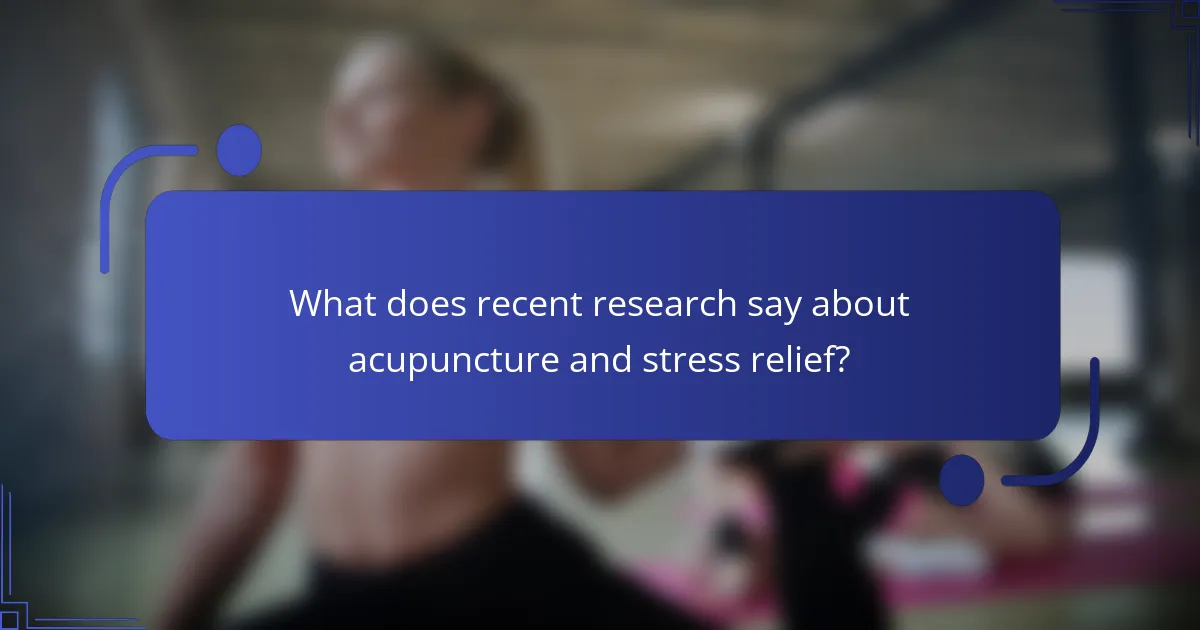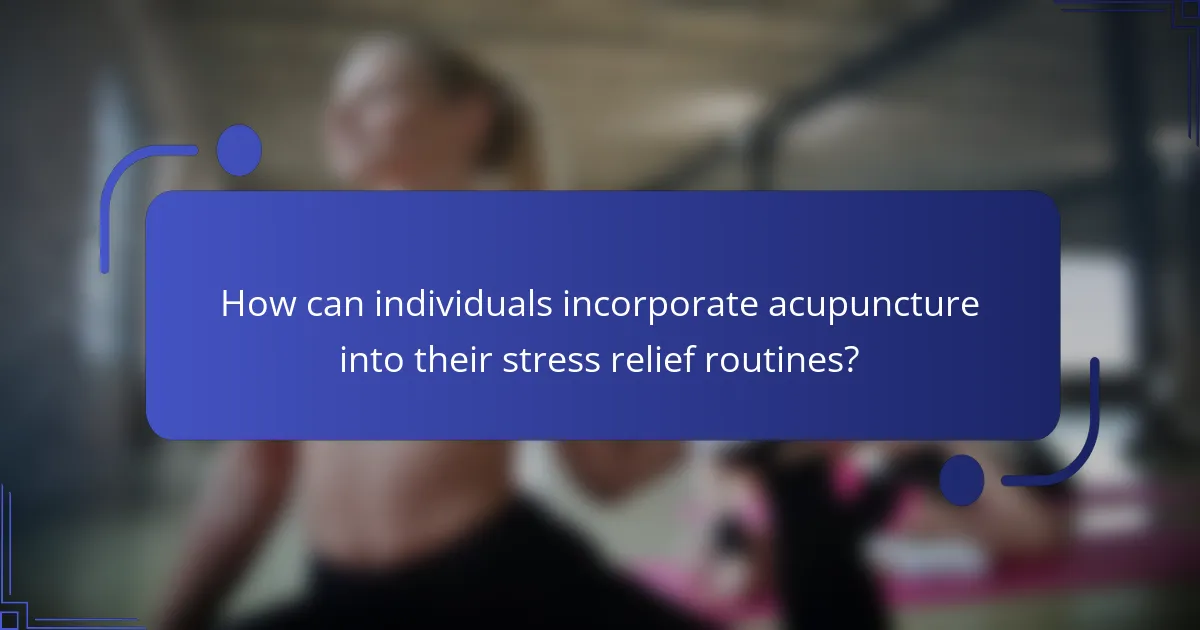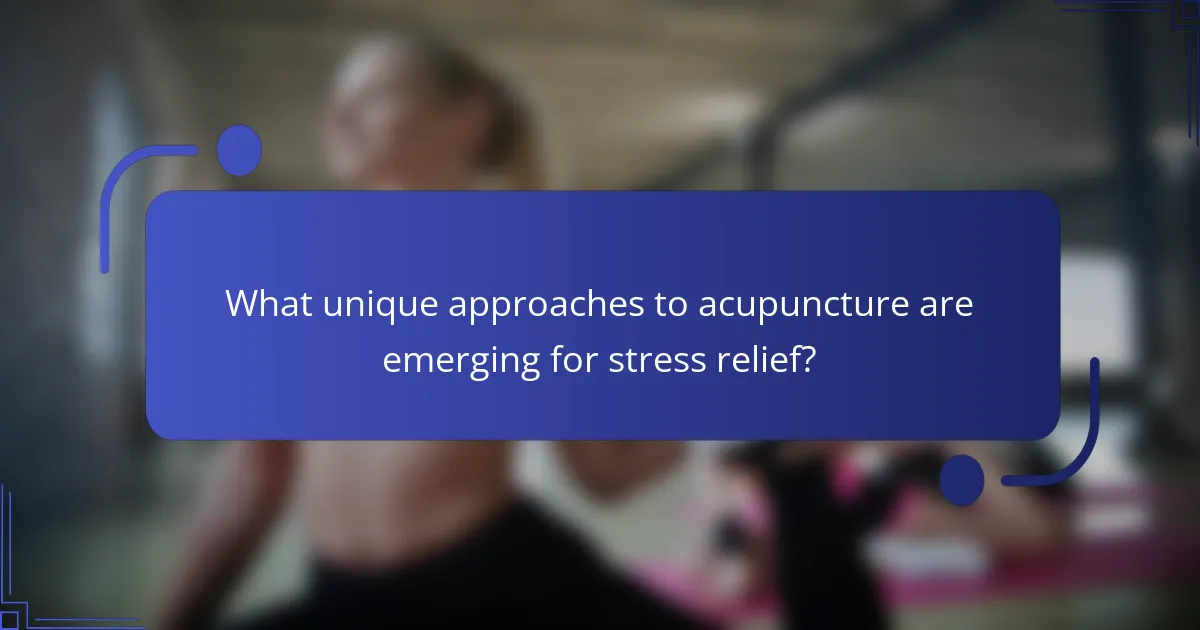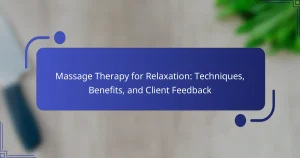Acupuncture offers a natural solution for stress relief by promoting relaxation and balancing energy flow. It effectively lowers cortisol levels, enhances mood, and improves overall well-being. Research highlights significant reductions in anxiety and stress-related symptoms following treatment. Innovative approaches like mindfulness-based acupuncture and auricular acupuncture further enhance its effectiveness in modern wellness practices.

How does acupuncture alleviate stress symptoms?
Acupuncture alleviates stress symptoms by promoting relaxation and balancing energy flow. It stimulates specific points, releasing endorphins and reducing cortisol levels. Research indicates that acupuncture can enhance mood and improve overall well-being. Clinical studies show significant reductions in anxiety and stress-related symptoms following treatment.
What physiological mechanisms are involved in acupuncture’s stress relief?
Acupuncture alleviates stress through various physiological mechanisms, including the release of endorphins and modulation of the autonomic nervous system. This therapy promotes relaxation by decreasing cortisol levels and enhancing blood circulation. Research indicates that acupuncture activates specific brain regions, leading to improved emotional regulation and reduced anxiety.
Which acupuncture points are most effective for stress relief?
The most effective acupuncture points for stress relief include Shenmen, Yintang, and Pericardium 6. These points help reduce anxiety and promote relaxation through targeted stimulation.
Shenmen, located on the ear, calms the mind and alleviates tension. Yintang, situated between the eyebrows, is known for its soothing effects on stress and insomnia. Pericardium 6, located on the wrist, balances emotions and reduces feelings of panic.
Research indicates that regular acupuncture targeting these points can significantly lower cortisol levels, enhancing overall well-being. Practitioners often recommend combining these points with breathing exercises for optimal results.

What are the proven benefits of acupuncture for stress management?
Acupuncture effectively reduces stress by promoting relaxation and balancing the body’s energy. Research shows it lowers cortisol levels, enhances mood, and improves overall well-being. A meta-analysis indicated that acupuncture can significantly decrease anxiety and related symptoms, providing a holistic approach to stress management. Additionally, acupuncture may improve sleep quality, further aiding in stress relief.
How does acupuncture compare to other stress relief methods?
Acupuncture is an effective stress relief method, often compared favorably to other techniques like yoga and meditation. Research shows that acupuncture reduces cortisol levels, promoting relaxation more effectively than some conventional methods. In contrast, yoga and meditation focus on mindfulness and physical activity, which also relieve stress but may not target the body’s energy flow as acupuncture does. Studies indicate that acupuncture can provide quicker relief for acute stress compared to these alternatives. Additionally, acupuncture’s unique attribute lies in its ability to address specific stress-related symptoms, such as anxiety and insomnia, making it a versatile choice for many individuals.
What psychological benefits can be gained from acupuncture?
Acupuncture can significantly reduce stress and improve mental well-being. Research indicates that acupuncture stimulates the release of endorphins, promoting relaxation and alleviating anxiety. Additionally, it can enhance sleep quality, which is crucial for mental health. A study found that patients reported a 50% reduction in stress levels after regular acupuncture sessions. This holistic approach addresses both physical and emotional aspects, leading to a balanced state of mind.

What does recent research say about acupuncture and stress relief?
Recent research indicates that acupuncture effectively reduces stress by promoting relaxation and balancing the body’s energy. Studies have shown that acupuncture can lower cortisol levels, enhance mood, and improve overall well-being. For instance, a 2022 meta-analysis found that patients receiving acupuncture reported significant reductions in stress and anxiety compared to control groups. Additionally, acupuncture’s unique ability to stimulate specific acupoints may facilitate the release of endorphins, further contributing to its stress-relieving effects.
Which studies highlight the effectiveness of acupuncture for stress?
Studies consistently demonstrate acupuncture’s effectiveness for stress relief. Research indicates that acupuncture can significantly reduce stress levels by promoting relaxation and enhancing overall well-being.
One notable study published in the Journal of Alternative and Complementary Medicine found that participants receiving acupuncture reported lower stress scores compared to those in control groups. Another research review highlighted acupuncture’s ability to regulate cortisol levels, a key stress hormone.
Additionally, a meta-analysis of multiple trials concluded that acupuncture is a beneficial intervention for managing stress-related symptoms. These findings support acupuncture’s role as a complementary therapy for stress relief.
What are the limitations of current research on acupuncture and stress?
Current research on acupuncture and stress has limitations that affect its reliability. Studies often lack rigorous controls, leading to variability in results. Sample sizes are frequently small, which limits generalizability. Furthermore, many studies do not adequately account for placebo effects, making it difficult to isolate acupuncture’s true impact. Additionally, there is inconsistency in treatment protocols, such as needle placement and session frequency, which complicates comparisons across studies. These factors hinder a comprehensive understanding of acupuncture’s efficacy for stress relief.

How can individuals incorporate acupuncture into their stress relief routines?
Individuals can incorporate acupuncture into their stress relief routines by scheduling regular sessions with a certified practitioner. This method effectively targets stress-related symptoms through specific points on the body. Research indicates that acupuncture can reduce cortisol levels, promoting relaxation. Many find it beneficial to combine acupuncture with mindfulness practices for enhanced results.
What should one expect during an acupuncture session for stress relief?
During an acupuncture session for stress relief, one can expect a calming environment, targeted needle placements, and a focus on relaxation. Practitioners assess individual stress points, often targeting specific meridians to enhance energy flow. Sessions typically last 30 to 60 minutes, allowing time for both treatment and relaxation. Many report immediate stress reduction and improved mood following the session, supported by research indicating acupuncture’s effectiveness in lowering cortisol levels, a key stress hormone.
How often should acupuncture treatments be scheduled for optimal stress management?
Acupuncture treatments for optimal stress management should be scheduled weekly for the first month, then bi-weekly or monthly as needed. Regular sessions help maintain balance and reduce stress effectively. Research indicates that consistent treatment enhances relaxation responses and overall well-being.

What unique approaches to acupuncture are emerging for stress relief?
Emerging approaches to acupuncture for stress relief include integrative techniques, mindfulness-based acupuncture, and auricular acupuncture. Integrative techniques combine acupuncture with other therapies, enhancing overall effectiveness. Mindfulness-based acupuncture focuses on awareness during treatment, promoting relaxation. Auricular acupuncture targets specific ear points, offering rapid stress relief. These innovative methods aim to enhance traditional practices and adapt to modern wellness needs.
How do cultural perspectives influence acupuncture practices for stress relief?
Cultural perspectives significantly shape acupuncture practices for stress relief. Different cultures emphasize distinct techniques, philosophies, and treatment goals. For instance, Traditional Chinese Medicine focuses on balancing energy, while Western adaptations may prioritize symptom relief.
Research indicates that cultural beliefs influence patient expectations and treatment outcomes. In some cultures, acupuncture is viewed as a holistic approach, integrating mind and body, which enhances its effectiveness for stress management. Additionally, cultural attitudes towards health and wellness can affect patient engagement and adherence to treatment plans.
Understanding these cultural nuances can improve practitioner-patient communication and tailor treatments to individual needs, ultimately enhancing the effectiveness of acupuncture for stress relief.
What innovative techniques are being developed in acupuncture for stress management?
Innovative techniques in acupuncture for stress management include the use of electroacupuncture, laser acupuncture, and mindfulness integration. These methods enhance traditional practices, providing more effective stress relief. Electroacupuncture applies electrical stimulation to acupuncture points, increasing relaxation and reducing anxiety levels. Laser acupuncture uses low-level lasers instead of needles, making it less invasive while still promoting calmness. Mindfulness integration combines acupuncture with meditation techniques, fostering a holistic approach to stress reduction. Research supports these advancements, showing improved outcomes in patient stress management.
Which rare acupuncture practices have shown promise in stress alleviation?
Certain rare acupuncture practices have shown promise in alleviating stress, including auricular acupuncture and scalp acupuncture. Auricular acupuncture targets specific ear points linked to stress relief, while scalp acupuncture focuses on the head to enhance relaxation and mental clarity. Research indicates these methods can effectively reduce anxiety and improve emotional well-being.
What expert tips can enhance the effectiveness of acupuncture for stress relief?
Expert tips to enhance acupuncture’s effectiveness for stress relief include finding a qualified practitioner, ensuring a comfortable environment, and maintaining consistent sessions. Additionally, integrating mindfulness techniques during treatment can amplify relaxation. Research indicates that acupuncture can lower cortisol levels, further supporting its role in stress management.


